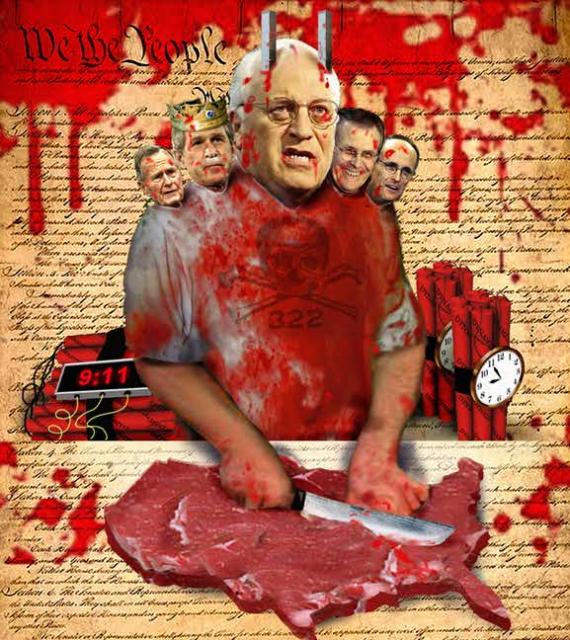Search
Recent comments
- journalism....
9 hours 33 min ago - day three.....
10 hours 17 min ago - lawful law?....
10 hours 36 min ago - insurance....
10 hours 43 min ago - terrorists....
10 hours 54 min ago - nukes?...
13 hours 2 min ago - rape....
13 hours 41 min ago - devastation.....
15 hours 52 min ago - bibi's dream....
17 hours 41 min ago - thus war....
21 hours 53 min ago
Democracy Links
Member's Off-site Blogs
Cheney, Howard and Hicks

Some nights I wonder how much of his visions Dick Cheney revealed to Howand and his cabinet. I'm still impressed how quickly after assuming power in '97, the year of Cheney's secondmost recent vist here (and the formative year of Halliburton Australia), the Australian space legislation was altered to fast-track plans for Woomera, and still wonder if the intended purpose was to use Kistler rockets to send troops into the middle east?
The railway and joint training facilities were perfect for manouvering US troops should the necessity arise, and the improved transport (owned by Cheney's business interests) opened up "Australian" industries - funded by how much "sub prime" money, I now wonder.. not the defence stuff, of course. The development of Adelaide's infrastructure as a support base for both mining and defence, and its "twinning" with Bush's Austin, were also coordinated by Cheney henchmen I have better proof of the Adelaide nepotism now, but can't let it out yet. Anyway, all this Australian stuff is just a sideshow to the spotlighted main stage of Cheney's Guantanamo facilities.
I came back to this train of thought reading Andy Worthington's succinct synopsis on the Guardian website:
---------------------------------------------
As for the remaining 80 detainees, the administration intends to prosecute them in war crimes trials, known as military commissions, which were dreamt up by vice-president Cheney and his close advisors in November 2001. Condemned by lawyers for relying on secret evidence, obtained through torture, which can be withheld from the defendant, the commissions have yet to demonstrate their viability.
After being struck down in the supreme court in 2006, they were revived last year, but have been criticised by their own judges, and are resolutely opposed by the detainees' military defence lawyers. Their only alleged success - the prosecution of David Hicks - was no such thing. Seeing a confession as his only escape route, Hicks accepted a plea bargain, admitting to "material support for terrorism" and dropping claims of abuse by US forces in exchange for a short sentence in Australia that has just come to an end.
-----------------------------------------------
Don't forget who got the contracts to build the camp and the courthouse, either. Cheney's business interests had a lot of money riding on the success of propaganda of the War On Terror. With their military interests agglomerated into a saleable subsidiary, they were able to initiate an international corporate transplant. They're in the process of severing themselves from the womb of the US and grafting themselves to the guts of the Middle East. Show me a government that can do that!.
David Hicks, a native of the city central to Cheney's Australian plans, became potentially pivotal to a greater level of Deadly Dick's activities. After all that work, the Vice President still didn't have an actual convict, and the challenges to his tribunal made it seem that no such convict would arise through any other avenue then a confession. Cheney rings Howard and (without the knowledge of Hicks' would-be prosecutors) a plea bargain is made, and Hicks is transferred to the tender care of an Australian State Government with their snouts securely in Cheney's back pocket- a position from which they're not likely to utter any politically compromising gainsays.
How must it feel for Howard to have once been involved in suchlike activities and suddenly become a thumb-twiddler. If he's out in a paddock whacking his balls around, he's probably doing so in the belief that it will help him maintain his sanity.- By Richard Tonkin at 15 Jan 2008 - 1:33am
- Richard Tonkin's blog
- Login or register to post comments
true rattus .....
It was January 9 last year when Morris Davis, the chief prosecutor for the Bush administration's military tribunals, took what he regards as a disturbing telephone call regarding David Hicks.
On the end of the line was the Pentagon's general counsel, William "Jim" Haynes. He asked Colonel Davis how soon he could charge Hicks.
The Australian had been held in custody without a hearing for five years after being picked up in Afghanistan in late 2001.
A political appointee, Mr Haynes is a controversial figure in Washington. He has tight connections with US Vice-President Dick Cheney, and in 2002 he endorsed for the military and the CIA the use of "enhanced" interrogation techniques, including waterboarding – a technique that simulates drowning and is regarded as torture by many legal experts.
But Mr Haynes's overture to get on with the Hicks matter, notwithstanding the delays to that point, was, by any measure, a bizarre request.
Hicks Case Rushed To Suit Howard